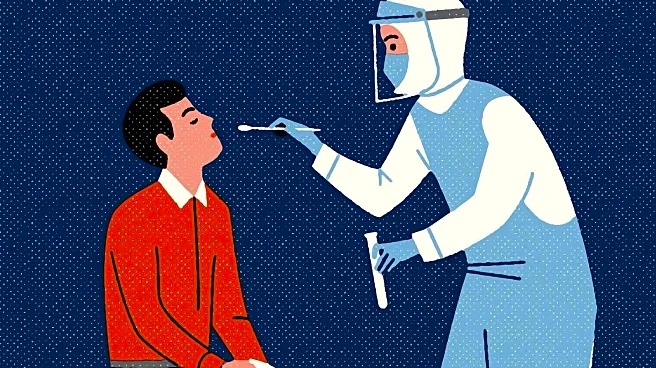What's Happening?
David Setters, a 68-year-old man from Redhill diagnosed with Motor Neurone Disease (MND), has expressed shock upon learning he no longer qualifies for a COVID vaccination under new NHS guidelines. MND is a progressive neurological disease that affects motor neurons in the brain and spinal cord, often leading to severe breathing difficulties. The UK Health Security Agency (UKHSA) has advised that clinical judgment should be applied when assessing a patient's risk from COVID-19, but the narrowing of eligibility criteria has led to confusion and frustration among patients and healthcare providers. Setters, who uses a ventilator at night, was directed to a pharmacy where the vaccine costs approximately £100, after being turned away from his GP. The Joint Committee on Vaccination and Immunisation (JCVI) has recommended COVID-19 vaccinations for adults aged 75 and over, care home residents, and immunosuppressed individuals, but not automatically for those with MND.
Why It's Important?
The change in vaccine eligibility criteria has significant implications for individuals with MND and other clinically vulnerable groups. The decision has sparked concern among patients and healthcare providers about the potential risks of COVID-19 exacerbating underlying conditions. Liberal Democrat MP Chris Coghlan has highlighted the issue, noting the poor communication surrounding the criteria changes and the need for clearer guidelines. The situation underscores the challenges faced by vulnerable populations in accessing necessary healthcare services and the importance of transparent communication from health authorities. The financial burden of purchasing vaccines privately may also pose a barrier for some patients, potentially impacting their health outcomes.
What's Next?
David Setters has arranged a date with his GP to receive his COVID vaccination, indicating that some patients may still access vaccines through clinical judgment. The ongoing debate over vaccine eligibility may prompt further discussions among policymakers and healthcare providers to address the needs of vulnerable groups. Advocacy efforts, such as petitions calling for continued NHS funding for COVID boosters for clinically vulnerable individuals, may influence future policy decisions. The UKHSA and JCVI may need to reassess their guidelines to ensure equitable access to vaccinations for all at-risk populations.
Beyond the Headlines
The situation raises ethical questions about healthcare access and the prioritization of resources during public health crises. The exclusion of certain vulnerable groups from automatic vaccine eligibility may reflect broader systemic issues in healthcare policy and resource allocation. The case highlights the need for ongoing dialogue between health authorities, patients, and advocacy groups to ensure that public health measures are inclusive and responsive to the needs of all individuals.









